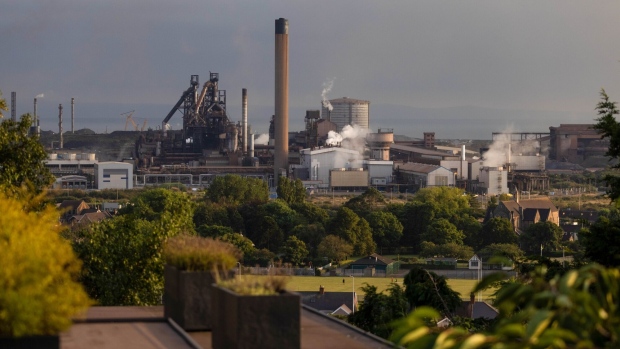Sep 15, 2023
UK to Pay Tata £500 Million to Keep Biggest Steelworks Running
, Bloomberg News

(Bloomberg) -- The UK will pay up to £500 million ($621 million) to help Tata Steel overhaul the country’s biggest steelworks and keep it running, the latest hefty subsidy in recent months to persuade companies to stay in Britain.
The payment will assist Tata transition its Port Talbot plant in South Wales to greener, cheaper steelmaking using electricity rather than coal, the company and the government said Friday. Tata will provide the remainder of the £1.25 billion capital cost, it said, adding the deal is subject to regulatory approval.
The agreement draws a line under a months-long standoff after the Indian company warned of “material uncertainty” over the future of a plant, which has struggled to make profits in the brutally low-margin industry. There is likely to be relief in Prime Minister Rishi Sunak’s government that a key component of Britain’s manufacturing sector appears to be surviving.
But there are significant caveats. About 3,000 jobs are expected to be affected by the technology transition, with the government’s intervention only able to safeguard around 5,000 of the 8,000 people Tata employs, it said. That creates a potential headache for Sunak ahead of an election expected next year.
More broadly, the payment underscores the precarious state of British industry in the absence of a state-driven industrial strategy, compounded by the impact of Brexit and the disruption to trade with the European Union.
In July, the government put forward £500 million in support for a new battery plant established by Tata Group’s Jaguar Land Rover. A smaller package was given to BMW AG, which said it would make its Mini electric models in the UK.
Still, it’s not just the UK under pressure. US President Joe Biden’s package of tax credits for green industry has also threatened to lure investment and business away from other nations, setting off an international scramble to keep pace. Sunak is expected to unveil a UK manufacturing plan later this year.
“We’re saving jobs that would have been lost. This is a transformation project,” Business and Trade Secretary Kemi Badenoch said in a pooled interview. “This is good for the taxpayer, this is good for the workforce.”
Steelmakers across Europe have received public subsidies to help fund the high capital cost of decarbonization. The industry still largely relies on coal-fired blast furnaces, and globally it accounts for 7% of carbon emissions.
The UK deal would see Tata replace its current coal-based operations with a single electric-arc furnace, with capacity to make 3 million tons a year, the company’s Chief Financial Officer Koushik Chatterjee said on an analyst call Friday. They produce steel by melting down scrap and other intermediate products in a far cleaner process.
The government said this will reduce the UK’s carbon emissions by around 1.5%, but the fact it requires fewer people to operate worries British labor unions.
“These plans are disgraceful, short-sighted and lack ambition. Steel is a foundation industry and the opportunity is being missed to make the UK a world leader in steel production,” said Sharon Graham, general secretary of the Unite union. “Unite will be fighting tooth and nail not only to save these jobs but to create more jobs in steel.”
--With assistance from Swansy Afonso.
(Updates with details on new plant in 10th paragraph)
©2023 Bloomberg L.P.







